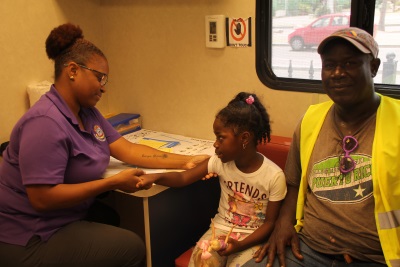 PHILIPSBURG(DCOMM):---The Collective Prevention Services (CPS), a department of the Ministry of Public Health, Social Development and Labour, continues to closely monitor the global measles situation as cases continue to climb based on the most recent information from the World Health Organization (WHO).
PHILIPSBURG(DCOMM):---The Collective Prevention Services (CPS), a department of the Ministry of Public Health, Social Development and Labour, continues to closely monitor the global measles situation as cases continue to climb based on the most recent information from the World Health Organization (WHO).
WHO reports: “Measles cases have continued to climb into 2019. Preliminary global data shows that reported cases rose by 300 percent in the first three months of 2019, compared to the same period in 2018. This follows consecutive increases over the past two years.
“While this data is provisional and not yet complete, it indicates a clear trend. Many countries are in the midst of sizeable measles outbreaks, with all regions of the world experiencing sustained rises in cases.”
Measles is a highly contagious virus that can cause potentially serious illness. As measles remains endemic in most parts of the world, it can spread to any country, including those that have eliminated the disease.
Every un- or under-immunized person regardless of age is therefore at risk of contracting the disease; this is especially true in those countries where persistently low immunization rates increase the risk of a large outbreak with possible tragic consequences.
The WHO reports that: “Current outbreaks include the Democratic Republic of the Congo, Ethiopia, Georgia, Kazakhstan, Kyrgyzstan, Madagascar, Myanmar, Philippines, Sudan, Thailand and Ukraine, causing many deaths – mostly among young children.
“Over recent months, spikes in case numbers have also occurred in countries with high overall vaccination coverage, including the United States of America as well as Israel, Thailand, and Tunisia, as the disease has spread fast among clusters of unvaccinated people.”
Countries should achieve and/or sustain at least 95% coverage with two doses of measles-containing vaccine to prevent circulation in the event of an importation of measles.
The WHO adds: “Measles is one of the world’s most contagious diseases, with the potential to be extremely severe. In 2017, the most recent year for which estimates are available, it caused close to 110 000 deaths. Even in high-income countries, complications result in hospitalization in up to a quarter of cases, and can lead to lifelong disability, from brain damage and blindness to hearing loss.”
Travelers who are not up to date with their vaccinations are at higher risk of contracting measles when in close contact with travelers from countries where the virus is still circulating.
CPS advises guardians and parents to check their children’s vaccination status to see whether they are up to date. Persons with fever or rash should consult their physician who would then alert CPS where the necessary surveillance actions can be taken.
If persons decide to travel, they should also check their vaccination status and to make use of every opportunity to get vaccinated according to the vaccination schedule. Consult your physician for additional information.
The majority of people who get measles are unvaccinated.
Other individuals who should get their vaccination status checked are, health care workers, pregnant women, pre-and exam class students, as well as groups at risks such as waste/garbage handlers, the Police, hotel and restaurant workers, and others to verify and update their vaccination status, particularly on Hepatitis B and Tetanus.









